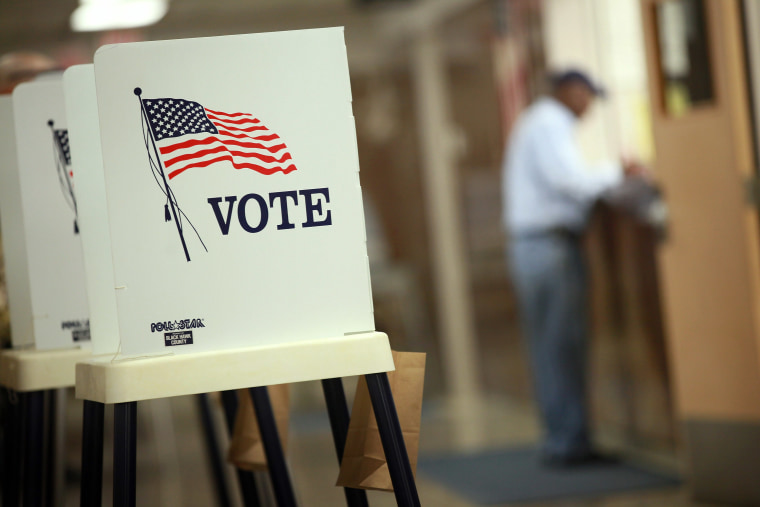Two weeks ago, I published a warning of sorts: "Don't be shocked if Trump's narrow deficit turns into a narrow advantage after the Republican National Convention."
How does that hold up? As of this morning, pretty well.
A pair of new polls out Monday give a conflicting picture of whether Donald Trump emerged from the Republican National Convention with a significant bump in support. In a new survey from CNN, Trump now leads Clinton in a head-to-head matchup, 48 percent to 45 percent.... But a new poll from CBS shows that the two candidates remain tied after the Cleveland convention, at 42 percent apiece, compared to 40 percent apiece before the conventions began.
Adding third-party candidates to the mix doesn't change the equation much: Trump still has a modest lead in the CNN poll, while the major-party candidates are still tied in the CBS poll.
One detail to keep in mind is the ongoing significance of the education gap: in the CNN poll, among white voters with college degrees, Hillary Clinton leads by four points, but among white voters without college degrees, Donald Trump enjoys a 37-point advantage. (Trump's boast earlier this year, "I love the poorly educated," comes to mind.)*
Maybe now is a good time to pause and take stock of where things stand.
It looks like Trump is getting a modest-but-real post-convention bump in the polls, but what do the polling averages say?
Like the polls themselves, there are some differences on this front. The Huffington Post's aggregator, as of this morning, with the new polls included, shows Clinton ahead by about half a percentage point, 42.4% to 41.7%. RealClearPolitics' aggregator shows Trump over Clinton, 44.1% to 43.9%, which also includes the latest results.
What about the broader polling analyses and prediction models?
The New York Times' model now shows Clinton with a 68% chance of winning the election, while Trump has a 32% change. FiveThirtyEight's "polls-plus" model -- which factors in economic data, historical trends, etc. -- shows Clinton with a 57.8% chance of success, to Trump's 42.2%. FiveThirtyEight also has a "polls-only" model that focuses exclusively on survey data, and it gives Clinton a 53.5% probability to Trump's 46.5%.
I keep hearing that this is a volatile period for polling. Is that true?
For the love of all that is good in the world, yes. As is true every four years, the polling around the time of the conventions tends to show some peaks and valleys, which don't necessarily tell us much about what to expect in the fall. This volatility will continue for a while.
Where were the polls at this point in other recent cycles?
Comparisons get a little tricky, in part because of the order of the conventions, and the fact that the incumbent White House party always holds its nominating convention second. Nevertheless, John McCain in 2008 and John Kerry in 2004 both enjoyed brief leads after their party gatherings, only to see their support fall soon after. (Mitt Romney in 2012 didn't quite catch up to President Obama over the summer, though his support did spike.)
Of course, post-convention bounces don't always fade. Though the broader circumstances had an effect, Bill Clinton's post-convention bump didn't fade and he won the 1992 race. Ronald Reagan saw a huge surge after the 1980 convention and he didn't look back. Maybe Trump is suddenly on his way to the Oval Office; maybe this is a temporary advantage. The point is, we don't yet know.
What about all of that punditry -- including yours -- that said the Republican convention was such a mess?
Well, that's a fair question. The truth is, the GOP gathering in Cleveland was a mess, complete with a plagiarism controversy and an ugly acceptance speech. There's no denying the fact that the Republican gathering was plagued by real mistakes that should have been avoided.
But it's also true that there's a portion of the public that just doesn't care. One of the points of any convention is to get like-minded partisans on board with the party's ticket, and for many rank-and-file Republicans, last week's red-meat message resonated -- even if that doesn't make sense to the reality-based community.* edited slightly for clarity
